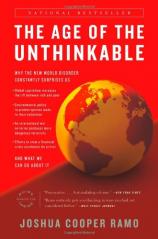Reading Group Guide
Discussion Questions
The Age of The Unthinkable: Why the New World Disorder Constantly Surprises Us And What We Can Do About It

1. In The Age of the Unthinkable, Joshua Cooper Ramo argues that we are in a revolutionary age with a global order that is changing around us exponentially faster than ever before. What does Ramo think has caused the global landscape to shift over the course of the past century, and how large a role do you think technology has played in this transformation? Does Ramo believe that this change was inevitable? Do you agree or disagree?
2. Consider the significance of Louis Halle’s observation that “foreign policy is made not in reaction to the world but rather in reaction to an image of the world in the minds of the people making decisions” (page 13). In light of Ramo’s argument, what is the fundamental problem with this approach to foreign policy?
3. What does Ramo mean by “We Won the Cold War!” illusions? Discuss some reasons why this mode of thinking could prove detrimental in a revolutionary era.
4. Explain the implications of Friedrich August von Hayek’s 1974 acceptance speech, “The Pretence of Knowledge,” for the Nobel Prize for Economics.
5. What was radical about Per Bak’s theory of a sandpile and its avalanches, and how does Ramo use “the sandpile effect” to further his argument? Can you think of some recent events in our history that exhibit similar patterns?
6. Ramo discusses the excessive provisions that governments often take to protect their countries from every possible danger --- even going as far as to say that such small-scale efforts make countries more vulnerable to disaster than they had previously been. What, according to Ramo, is the difference between “resistance” and “resilience,” and which does he think should be adopted in today’s changing world?
7. Does Ramo believe that the chaos of the past decade --- terrorism, war, recession --- has had any kind of positive influence on our society? If so, what form has it taken?
8. What does Ramo mean by the term mashup and how does it relate to luminaries such as Gertrude Stein, Pablo Picasso, Michael Moritz, and Shigeru Miyamoto, about whom he writes? What do they all have in common?
9. History, both personal and collective, is a subject that necessitates a particularly careful balance in the minds of world leaders and individuals alike. In two instances Ramo writes that “history became data; the future became output” (page 23) and that “there is finally no way to walk away from history or stick it behind glass like some diorama” (page 258). In order to think and act like a revolutionary, to master an “instinct for cataclysm,” what role does history play in our ability to adapt and move forward? Which aspects of the past must we bring with us, and which must we forsake?
10. What does Ramo think that this revolutionary age demands of each of us? Discuss his ideas about how we can learn to anticipate the unexpected and begin to live more resilient lives.
The Age of The Unthinkable: Why the New World Disorder Constantly Surprises Us And What We Can Do About It
- Publication Date: June 2, 2010
- Paperback: 304 pages
- Publisher: Back Bay Books
- ISBN-10: 0316118117
- ISBN-13: 9780316118118







